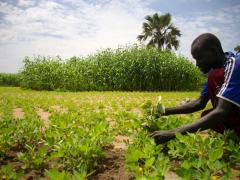Unlocking the future of African agriculture
Unlocking the future of African agriculture
December 8, 2014
"It is often said that a house is only as strong as the foundation upon which it sits. The same may be said for the importance of soils in keeping our agricultural sector productive, sustainable and resilient.
Soils are the cornerstone of our food chain, yet they receive scant attention or recognition for the role they play. For this reason, the United Nations has declared 2015 as the International Year of Soils – to raise awareness while coordinating various sectors’ efforts to research and care for soils.
Perhaps nowhere else than in Africa is this issue of soil more important. More than 70 percent of the African population relies on agriculture in some way for their livelihoods, and its growth has the potential to catalyze much broader development goals – from reducing poverty and hunger to improving health and nutritional status.
Africa has 60 percent of the world’s remaining uncultivated arable land, yet Africa’s soils are in crisis. It is estimated that 65 percent of arable land is degraded by eroding topsoil or depleted nutrients from “unhealthy” farming practices. The economic loss from these nutrient losses are estimated to be worth the equivalent of $4 billion annually in sub-Saharan Africa alone.
In a continent whose population is predicted to add almost one billion additional people by the year 2030, our soils present a strategic natural resource for nations. African countries are at a critical point in their development where they can harness – as most other developed countries have already done – agriculture’s role in driving economic prosperity.
This agricultural transformation in Africa will require both smallholder farmers as well as commercial farmers to symbiotically work together. More critically, it will also require the commitment of African political leaders to live up to the commitments they made in the 2003 Maputo Declaration, where they adopted the Comprehensive Africa Agriculture Development Programme (CAADP) as a framework for the restoration of agriculture growth and food security and where they further pledged to increase budget allocations to agriculture to 10 percent of GDP expenditure."
Read more from Business Day
Photograph from Wikipedia
